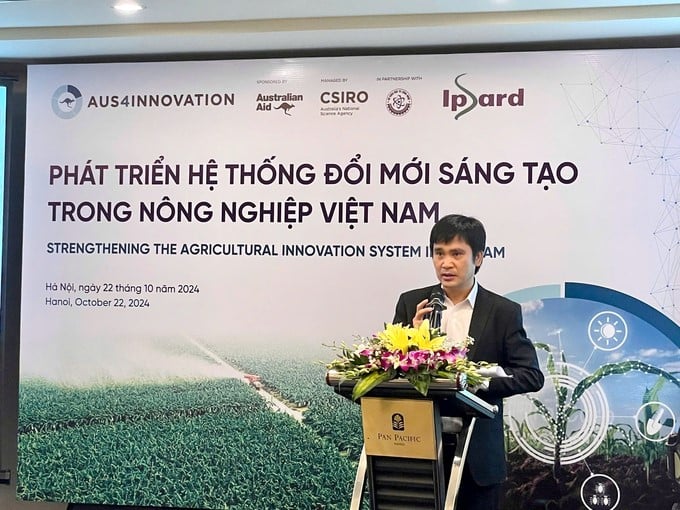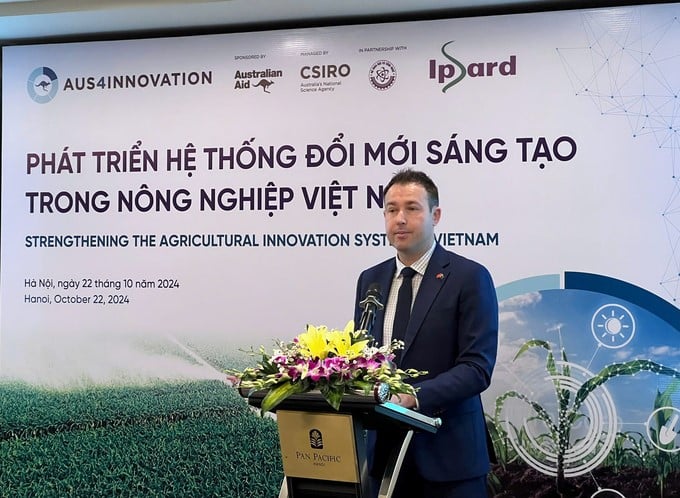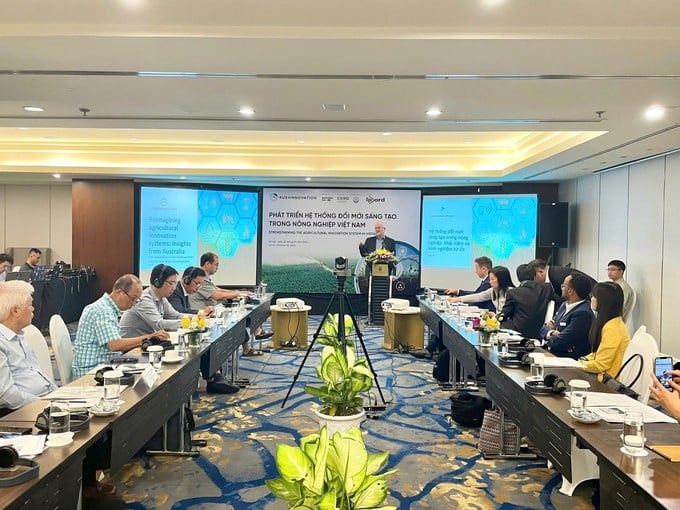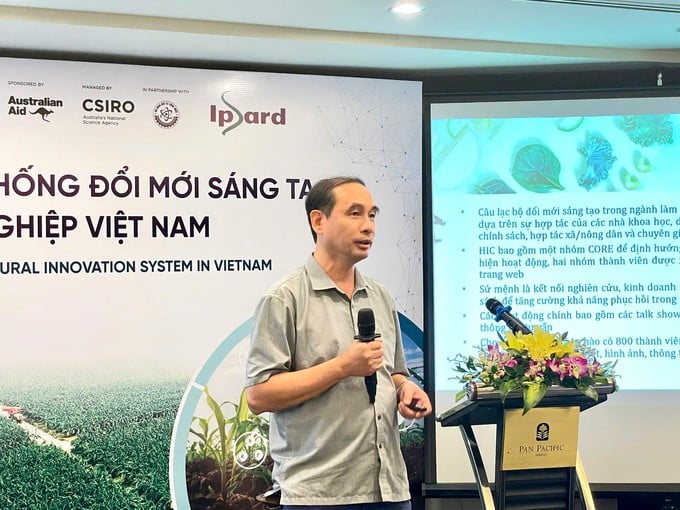June 1, 2025 | 16:48 GMT +7
June 1, 2025 | 16:48 GMT +7
Hotline: 0913.378.918
June 1, 2025 | 16:48 GMT +7
Hotline: 0913.378.918
The workshop is within the framework of the research "Strengthening the agricultural innovation system: Proposing solutions and policies suitable to the context of agricultural development in Vietnam," with sponsorship from the Aus4Innovation Program of the Australian Embassy.
Sharing about the research project, Dr. Tran Cong Thang, Director of the Institute of Policy and Strategy for Agriculture and Rural Development (IPSARD), said that the research is implemented in the 2023–2025 period, with the goal of improving the effectiveness of the agricultural innovation system to solve economic, social, and environmental challenges that the agricultural sector is and will be facing in the future.
Based on lessons learned from practices in Vietnam and other countries, especially Australia, the research will propose solutions and policies to strengthen the effectiveness of the agricultural innovation system in Vietnam. At the same time, the project will also contribute to the process of developing the Law on Science and Technology.

Dr. Tran Cong Thang, Director of the Institute of Policy and Strategy for Agriculture and Rural Development (IPSARD), shared about the research project. Photo: TT.
At the workshop, Dr. Kim Wimbush, CSIRO Counselor (Australian Embassy) and Director of the Aus4Innovation Program, emphasized the importance of innovation in solving challenges that Vietnam's agricultural sector is facing.
Dr. Kim Wimbush said: "With today's agriculture, strengthening the innovation system is an urgent issue to not only increase productivity but also improve resilience to climate change and environmental problems. We hope this system will help farmers in Vietnam and countries around the world benefit from technological innovations."
The agricultural innovation system in Vietnam has contributed significantly to the outstanding development of the sector in recent times. Statistics show that science and technology have contributed over 35% to the success of Vietnam's agriculture.

Dr. Kim Wimbush, CSIRO Counselor (Australian Embassy) and Director of the Aus4Innovation Program, emphasized the importance of innovation in Vietnam's agricultural sector. Photo: TT.
In the 2011–2021 period, the GDP of the agro-forestry-fishery sector reached an average growth rate of 2.84%/year. In 2023 alone, the agricultural sector reached a growth rate of 3.83%, the highest level in recent years. The export turnover of agricultural products in 2023 is estimated to reach over USD 53 billion, with the entire sector's trade surplus of more than USD 11 billion, accounting for 42.5% of the country's total trade surplus.
Large enterprises such as TH, Dabaco, Nafoods, Masan, and Ba Huan have boldly applied high technology in production and processing to improve the added value and competitiveness of Vietnamese agricultural products on the international market.
However, Vietnam's agricultural sector still faces many challenges. Climate change, shrinking cultivated area, environmental pollution, and high post-harvest losses are prominent issues. Besides, production scale is still small, and preservation and processing technology is not optimized, reducing the competitiveness of agricultural products. Furthermore, farmers' income is still unstable, causing their lives to not really be improved sustainably.

Prof. Andy Hall, senior expert at the Commonwealth Scientific and Industrial Research Organization (CSIRO) of Australia, shared about how Australia has successfully applied the innovation system. Photo: TT.
Sharing about how Australia has successfully applied the innovation system, Prof. Andy Hall from CSIRO emphasized: "The key point of innovation lies in the continuous feedback from practice to evaluate the effectiveness of initiatives. In Australia, we do not strictly manage science and technology but always appreciate the value of innovation, paying special attention to sustainability."
According to Mr. Hall, to improve the effectiveness of innovation, it is necessary to orient the entire innovation system, have a clear direction through joint discussion, and determine the development direction to have consensus and agreement on methods and interests of all parties.
Sharing the same opinion, Assoc.Prof.Dr. Dao The Anh, Deputy Director of the Vietnam Academy of Agricultural Sciences, proposed the need to build a flexible intermediary organization to connect participating parties in the innovation system. He also emphasized the role of community agricultural extension in promoting innovation and proposed building a separate innovation project for Vietnam's agricultural sector.

Assoc.Prof.Dr. Dao The Anh, Deputy Director of the Vietnam Academy of Agricultural Sciences, proposed the need to build a flexible intermediary organization to connect participating parties in the innovation system. Photo: TT.
In addition, the delegates highly appreciated the project's goal and expected the project's upcoming research results to clearly identify what is working well in the current agricultural innovation system and point out the system's gaps and bottlenecks. From there, propose directions and solutions to strengthen the capacity of the agricultural innovation system in Vietnam to respond to the new context in the future.
Therefore, strengthening the agricultural innovation system is not only a current requirement but also a foundation for the sector's sustainable development in the future. Vietnam, with lessons from domestic practice and international experience, especially from Australia, needs to further promote research and application of science and technology in agricultural production. Only then can farmers truly benefit from new advances, improve their lives, and enhance the position of Vietnamese agricultural products in the international market.
Translated by Thu Huyen

(VAN) Several scientists and farmers are experimenting with soil treatment in some key durian-growing regions such as Cai Lay (Tien Giang), Dak Song, Gia Nghia, and Dak R’lap (Dak Nong).
/2025/05/25/4127-3-073637_820.jpg)
(VAN) Thanks to the promotion from an FAO-implemented project, vegetable production in greenhouses in Moc Chau has seen strong development, from 1.5 hectares in 2021 to nearly 50 hectares in 2024.

(VAN) FAO has recently supported USD 140,000 to implement the project 'Risk mitigation human-animal interface risks through disease control initiatives in pig farming.'

(VAN) The People's Committee of Tra Vinh province has approved an adjustment to the investment policy for the Green Hydrogen Plant project, increasing its area to approximately 52.76 hectares.
![Reducing emissions from rice fields: [2] Farmers’ commitment to the soil](https://t.ex-cdn.com/nongnghiepmoitruong.vn/608w/files/news/2025/05/05/dsc08881jpg-nongnghiep-140632.jpg)
(VAN) Clean rice cultivation model in Thuong Tan commune, Bac Tan Uyen district, is assisting local residents in achieving sustainable agriculture by substantially reducing costs, increasing productivity, and protecting the environment.

(VAN) At the conference to disseminate Resolution No. 68, AgriS introduced its digital agricultural ecosystem and reaffirmed its commitment to accompanying the Government in promoting private sector development and sustainable agriculture.

(VAN) 'Blue Ocean - Blue Foods' initiative is designed to restore marine ecosystems and establish sustainable livelihoods for local communities by cultivating a minimum of 1,000 hectares of cottonii seaweed in the first three years.